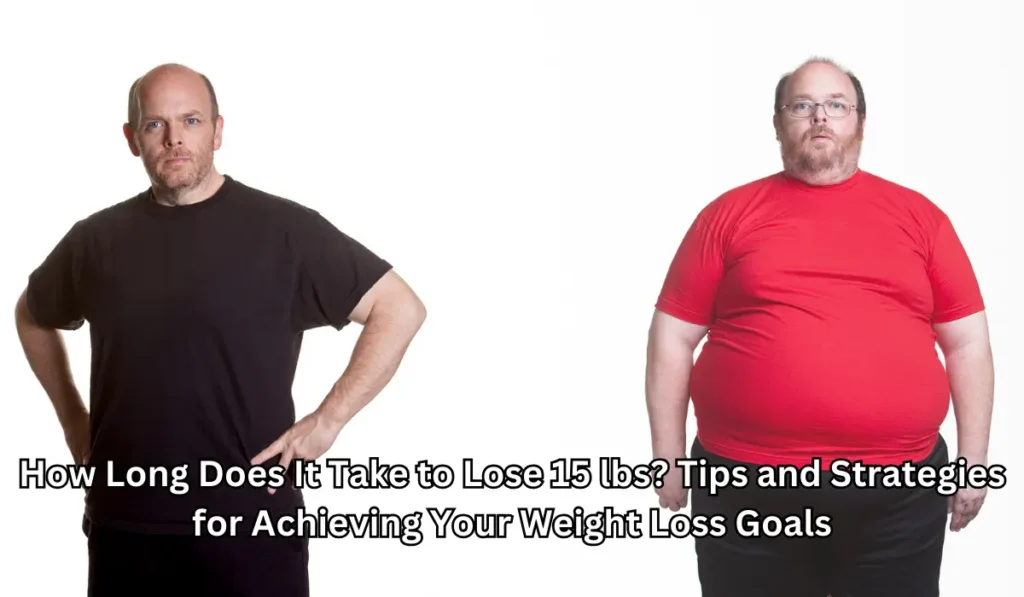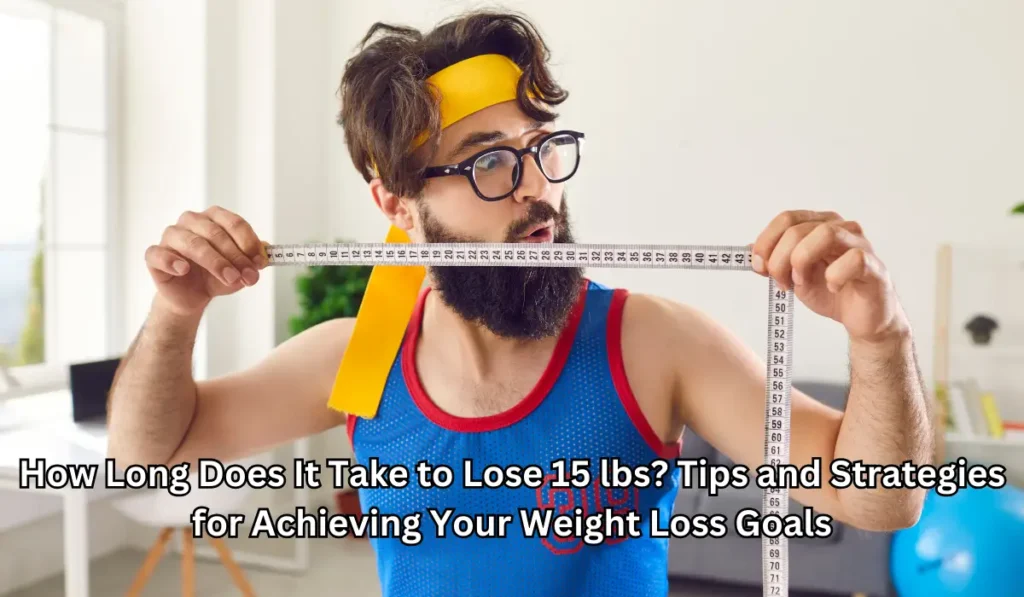
How Long Does It Take to Lose 15 lbs? Tips and Strategies for Achieving Your Weight Loss Goals
Losing weight can be a challenging task, especially when you have a specific goal in mind. For many people, losing 15 lbs is a popular weight loss goal, as it can make a significant difference in how they look and feel. However, the question that many people have is, “how long does it take to lose 15 lbs?”
The answer to this question depends on several factors, including your current weight, age, gender, and activity level. However, in general, it is safe to say that losing 15 lbs can take anywhere from a few weeks to several months, depending on the approach you take.
In this article, we’ll explore the different strategies and tips that can help you achieve your weight loss goals and answer the question of how long it takes to lose 15 lbs. We’ll also delve into the science of weight loss and explore the role of diet, exercise, and lifestyle changes in achieving sustainable weight loss.
Whether you’re looking to lose weight for health reasons or just to fit into that special outfit, this guide has got you covered. By the end of this article, you’ll have a clear understanding of the steps you need to take to achieve your weight loss goals and maintain your ideal weight for years to come. So, let’s dive in!
Understanding the Science of Weight Loss
Losing weight is more than just a matter of cutting calories and hitting the gym. To achieve sustainable weight loss, it’s important to understand the science behind how our bodies store and burn fat.
At its core, weight loss is about creating a calorie deficit, which means consuming fewer calories than you burn. However, it’s not always as simple as that. Our bodies have complex systems in place to regulate our metabolism and energy balance, which can make it challenging to lose weight.
One key factor in weight loss is the hormone insulin. Insulin is produced by the pancreas and helps regulate blood sugar levels. When we eat carbohydrates, our bodies convert them into glucose, which triggers the release of insulin. Insulin helps shuttle glucose into our cells to be used for energy, but it also signals our bodies to store any excess glucose as fat.
Another hormone that plays a role in weight loss is leptin. Leptin is produced by fat cells and helps regulate our appetite and metabolism. When we lose weight, our fat cells shrink, which can cause a drop in leptin levels. This drop in leptin can trigger hunger and cravings, making it harder to stick to a weight loss plan.
By understanding these complex systems, we can better tailor our approach to weight loss. For example, reducing our intake of refined carbohydrates can help lower insulin levels and promote fat burning. Similarly, incorporating resistance training into our exercise routine can help build lean muscle mass, which can help boost metabolism and promote weight loss.
Overall, understanding the science of weight loss can help us make informed decisions about our diet and exercise habits, and can help us achieve sustainable weight loss in the long run.
Read about Does Pre Workout Break a Fast
How Many Calories Do You Need to Burn to Lose 15 lbs?
To lose 15 lbs, you need to create a calorie deficit by burning more calories than you consume. A pound of fat contains around 3,500 calories, so to lose 15 lbs, you’ll need to create a calorie deficit of 52,500 calories over a period of time.
The amount of time it takes to burn 52,500 calories depends on a number of factors, including your current weight, activity level, and diet. In general, a safe rate of weight loss is around 1-2 lbs per week, which equates to a calorie deficit of 500-1000 calories per day.
So, to lose 15 lbs in 10 weeks, you would need to create a daily calorie deficit of around 1,750 calories (assuming a pound of fat contains 3,500 calories). This could be achieved through a combination of diet and exercise, such as cutting 500 calories from your diet and burning an additional 1,250 calories through exercise each day.
It’s important to note that everyone’s calorie needs are different, and creating too large of a calorie deficit can be unsustainable and even unhealthy. Consult with a healthcare professional or registered dietitian to determine a safe and sustainable calorie deficit for your individual needs and goals.

Creating a Realistic Weight Loss Plan
Creating a realistic weight loss plan is essential for achieving your weight loss goals. Here are some steps to help you create a plan that works for you:
- Set realistic goals: Setting realistic goals is key to staying motivated and avoiding disappointment. Aim to lose 1-2 lbs per week, as this is a safe and sustainable rate of weight loss.
- Identify your “why”: Identify your reasons for wanting to lose weight. This can help you stay motivated and focused on your goals. Whether it’s for health reasons or to feel more confident in your body, having a clear “why” can help you stay on track.
- Create a meal plan: A healthy meal plan can help you stay on track with your calorie goals and ensure you’re getting the nutrients your body needs. Plan out your meals and snacks for the week ahead, and focus on whole, nutrient-dense foods.
- Incorporate exercise: Exercise is important for both physical and mental health, and can help you achieve your weight loss goals. Choose activities you enjoy and aim for at least 150 minutes of moderate-intensity exercise per week.
- Track your progress: Tracking your progress can help you stay motivated and see the progress you’re making. Keep a food diary, track your workouts, and take measurements to see how your body is changing.
- Stay flexible: Remember that life happens, and it’s okay to deviate from your plan sometimes. The key is to be flexible and get back on track as soon as possible.
By following these steps and creating a realistic weight loss plan, you can set yourself up for success and achieve your weight loss goals in a sustainable way. Remember to be patient and kind to yourself, as weight loss is a journey and not a quick fix.
The Role of Diet in Achieving Sustainable Weight Loss
Diet plays a critical role in achieving sustainable weight loss. Here are some key tips to help you create a healthy and sustainable diet plan:
- Focus on whole, nutrient-dense foods: Whole, nutrient-dense foods are rich in vitamins, minerals, and fiber, which can help you feel full and satisfied while also providing your body with the nutrients it needs. Focus on foods like fruits, vegetables, whole grains, lean protein sources, and healthy fats.
- Monitor your calorie intake: To lose weight, you need to create a calorie deficit by consuming fewer calories than you burn. Use a food diary or calorie-tracking app to monitor your calorie intake and make sure you’re staying within your calorie goals.
- Limit processed and high-calorie foods: Processed and high-calorie foods, like sugary snacks and fast food, can be high in calories and low in nutrients. Limit these foods and focus on nutrient-dense options instead.
- Drink plenty of water: Drinking water can help you stay hydrated and may even help you feel fuller, leading to fewer cravings and overeating.
- Avoid crash diets: Crash diets can lead to rapid weight loss but are often unsustainable and can be harmful to your health. Instead, focus on making sustainable changes to your diet and lifestyle that you can maintain long-term.
Remember, making small, sustainable changes to your diet can be more effective than making drastic changes all at once. Focus on building healthy habits and making changes that you can maintain over time, rather than trying to follow a strict diet plan that is difficult to sustain.

The Importance of Exercise in Losing 15 lbs
Exercise is an essential component of any weight loss plan, and plays an important role in helping you lose 15 lbs. Here are some of the key benefits of exercise:
- Burns calories: Exercise helps you burn calories, which can help you create the calorie deficit needed to lose weight. Aim for at least 150 minutes of moderate-intensity exercise per week, such as brisk walking or cycling.
- Builds muscle: Resistance training, such as weight lifting, can help you build muscle mass. Muscle burns more calories at rest than fat, so building muscle can help boost your metabolism and promote weight loss.
- Reduces stress: Exercise can help reduce stress, which is important for both physical and mental health. Stress can lead to overeating and weight gain, so finding ways to manage stress through exercise can be beneficial for weight loss.
- Improves cardiovascular health: Regular exercise can improve cardiovascular health, which is important for overall health and well-being. Aim for activities that get your heart rate up, such as running or swimming.
- Increases energy: Exercise can increase energy levels, which can help you stay active and burn more calories throughout the day.
Remember, exercise doesn’t have to be intense or time-consuming to be effective. Find activities you enjoy and make them a regular part of your routine. Even small amounts of activity, such as taking the stairs instead of the elevator, can add up over time and help you achieve your weight loss goals.
Read about Tips for Achieving a 400lb Bench Press
Lifestyle Changes That Can Help You Lose Weight
In addition to diet and exercise, making lifestyle changes can be an effective way to lose weight and maintain a healthy weight. Here are some key lifestyle changes that can help you achieve your weight loss goals:
- Get enough sleep: Sleep plays a critical role in regulating hormones that affect appetite and metabolism. Aim for at least 7-8 hours of sleep per night to help support your weight loss efforts.
- Manage stress: Stress can lead to overeating and weight gain, so finding ways to manage stress is important for weight loss. Try activities like meditation, yoga, or deep breathing exercises to help reduce stress.
- Drink alcohol in moderation: Alcohol is high in calories and can lead to overeating, so it’s important to drink in moderation if you’re trying to lose weight. Aim for no more than one drink per day for women and two drinks per day for men.
- Practice mindful eating: Mindful eating involves paying attention to your food and how it makes you feel. This can help you avoid overeating and make healthier food choices.
- Stay hydrated: Drinking plenty of water can help you stay hydrated and may even help you feel fuller, leading to fewer cravings and overeating.
- Find a support system: Having a support system can be helpful when trying to lose weight. Consider joining a weight loss support group or working with a weight loss coach to help keep you motivated and accountable.
By making these lifestyle changes, you can create a healthy and sustainable environment that supports your weight loss goals. Remember to be patient and kind to yourself, as weight loss is a journey that takes time and effort.